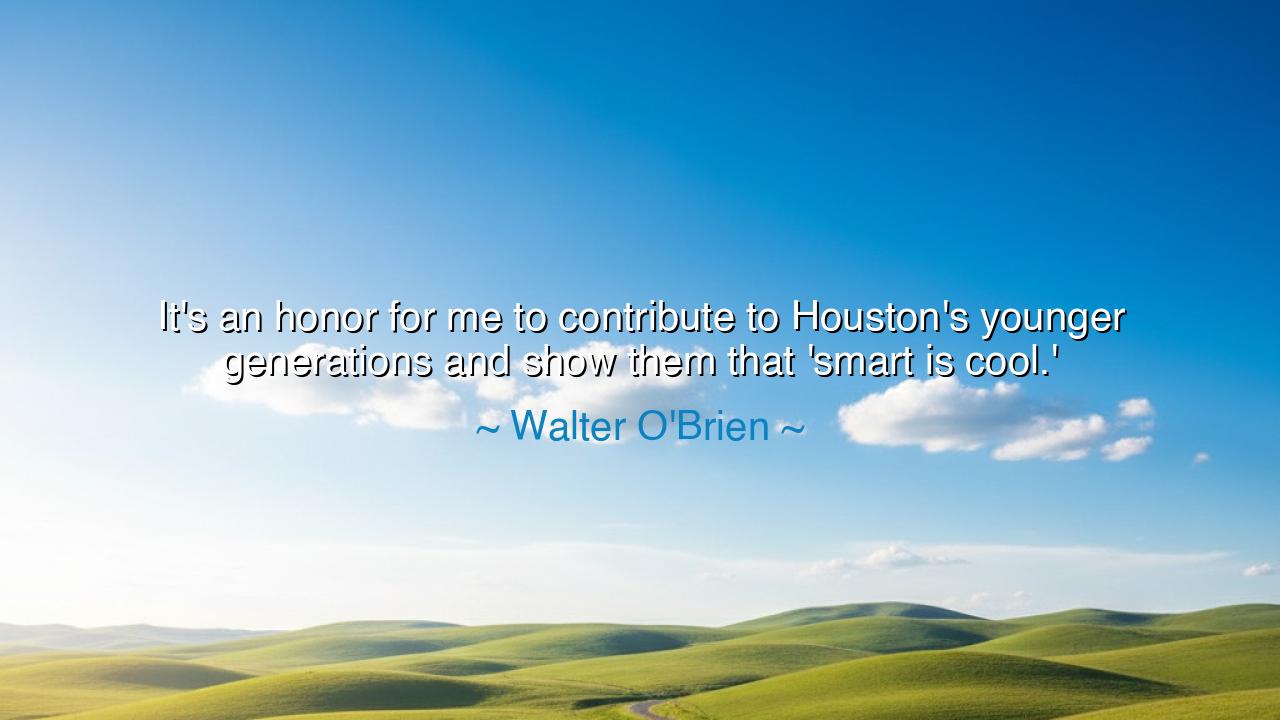
It's an honor for me to contribute to Houston's younger
It's an honor for me to contribute to Houston's younger generations and show them that 'smart is cool.'






"It's an honor for me to contribute to Houston's younger generations and show them that 'smart is cool.'" With these words, Walter O'Brien, a figure renowned for his exceptional intellect and technological achievements, speaks to a truth that resonates deeply within the human spirit: the power of knowledge and wisdom is often overshadowed by the allure of popularity and superficiality. In a world that places a premium on outward appearance, wealth, and fame, O'Brien's declaration reminds us that true strength and coolness lie not in external accomplishments but in the inner power of the mind. He aims to show the younger generation that it is not only acceptable to be intelligent, but that being smart is something to be celebrated.
This idea is far from new, for the ancients themselves understood the profound value of wisdom. Socrates, the great Greek philosopher, spent his life challenging the prevailing notions of his time, teaching his students that the true path to greatness was through the cultivation of the mind. He famously stated, "The unexamined life is not worth living." In doing so, he elevated intellectual pursuit above all else. For Socrates, wisdom was not merely a tool for personal gain; it was the very essence of a fulfilling life. To him, and to those who followed in his footsteps, being smart was the ultimate form of coolness—it was the means by which one could navigate the complexities of life with clarity and purpose.
Similarly, in the ancient Roman world, figures like Cicero and Seneca held knowledge and intellect in high regard. Cicero, a philosopher and statesman, believed that the most noble pursuit a person could undertake was the development of their mind. His writings on ethics and rhetoric emphasized the importance of reason as the foundation of a good life. In his view, true power was not derived from military might or political position, but from the ability to think critically and act justly. In a sense, Cicero was calling for a society where being smart was not only respected but revered—a society that O'Brien echoes in his own work with the younger generation.
Walter O'Brien, through his words and actions, reflects this ancient wisdom, aiming to reshape how young people view intelligence. In an age dominated by technology and innovation, it is easy to be seduced by the allure of quick success or the trappings of fame. Yet, O'Brien’s mission is to show that the true coolness lies in the pursuit of knowledge, in the power of problem-solving, and in the ability to think critically. Just as the Renaissance thinkers like Leonardo da Vinci and Michelangelo bridged the worlds of art and science, O'Brien seeks to inspire a generation to embrace the union of creativity and intellect. To be smart, to think deeply, is to hold the key to shaping the future.
Consider the story of Benjamin Franklin, one of the most influential figures in early American history. Franklin, though known for his wit and pragmatism, was also a passionate advocate for learning and intellectual curiosity. He believed that one could find joy not just in the material wealth of the world, but in the wealth of knowledge. His life exemplifies the idea that being smart is not only powerful but deeply fulfilling. Franklin, like O'Brien, demonstrated that intelligence could not only transform individual lives but also society at large. It is through the cultivation of our minds that we unlock the full potential of our actions, both for ourselves and for the world.
The lesson that O'Brien imparts is both profound and timeless: intellect is not something to be hidden or feared, but something to be proudly embraced. In a world that often values appearance over substance, it is courageous to stand up and declare that being smart is, in fact, the coolest thing a person can be. His words remind us that the future belongs not to those who seek fleeting fame, but to those who devote themselves to learning, innovation, and critical thinking. These are the qualities that will not only shape our personal destinies but will leave a lasting mark on society.
In practical terms, let us take O'Brien’s call to heart: celebrate intelligence in all its forms, whether in the classroom, in our work, or in our relationships. Encourage the pursuit of knowledge, problem-solving, and creativity in our daily lives. The world will always value the quick and flashy, but true coolness lies in those who choose to think deeply, challenge the status quo, and contribute to the greater good with their minds. In doing so, we pass down the most valuable legacy: the idea that intelligence, coupled with compassion and purpose, is the highest form of achievement and the truest cool.






AAdministratorAdministrator
Welcome, honored guests. Please leave a comment, we will respond soon